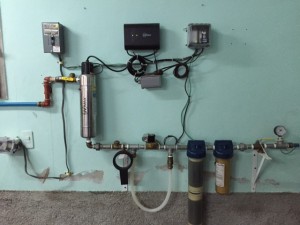Finding Water in Cuba

A few days ago I drank water from a spigot in Itabo, Cuba. It was the water of life.
I don’t know why this is, but almost always we must go to the desert to find water. Of course no one “goes to the desert to find water.” We find ourselves in desert spots, places where we aren’t expecting water, and then WHAM, it pours from the rock.
I was in Cuba with a mission team. As well as any group can, we went intentionally seeking to look, listen and learn—not to “help” other people. But let’s be honest: it’s pretty hard for privileged white people visiting third-world countries not to harbor secret feelings of noblesse oblige. And that’s easy to feel in Cuba, a world of faded glory in a state of staggering decrepitude, a world in which nearly everything is falling apart, falling down.
It happened at a church in a place called Itabo. Years ago the roof had fallen in and they had managed to replace it and to renovate the whole building. That alone was slightly miraculous. But the renovation of St. Mary the Virgin in Itabo was not finally about the members of the church. It was about the whole community. They planted a garden and sold the produce at a discount to the town. Then, since the water isn’t really potable, they installed a water filtration system.
If you or I installed such a system in our home or in our church, it would be for us, for our church. These people ran a pipe all the way to the front gate of the church, and installed a spigot right at the entry. From 8:00 till 5:00 every day anyone in town can come and fill their jugs with water—the only place in town to get pure, filtered water.
I thought, What a beautiful image of the church: the one place to come for the water of life. I filled my water bottle and wondered, How could my church offer that water of life to our community?
I struggled to think of a way. No one in my town needs clean, pure water. We like to pretend that we are so far above those basic survival needs of the world’s poor and struggling masses. But really, we know better. People who “have it all” can still have an aching heart.
And here is where the critique of the “decadent West” or the “brutalism of the Market” rings true (even if we don’t want it to). They say—in places like Cuba—So if you got that new car, and you got that 5,000 square-foot house, and thought nothing of dropping a thousand dollars on an intimate dinner; so if you finally got that gleaming smart phone and were actually connected to the Internet…what would you have, who would you be?
You would be—they say of us, in the words of T.S. Eliot, a “hollow man,” a “hollow woman,” with a richly adorned exterior . . . and nothing on the inside, except selfishness and greed and all the illnesses that go with it: loneliness, depression, addiction, anxiety, and a strange form of hopelessness that springs up only in the Land of Plenty and Excess.
In other words—in Jesus’ words—“What shall it profit a man if he gain the whole world and lose his own soul, or what shall a man give in exchange for his soul?”
I drank of that water and connected the same old dots that keep drifting apart in my fearful little mind: “poor” people know more about generosity than “rich” people; people with no security (as we reckon that term) are far more willing to share what they have with their neighbors; the “good life” is so simple and plain; there is in fact something more to life, but it can only be found in less and less.
It’s the same old story. You go to the desert and find water. You go to Cuba and discover riches and freedom and community.
Thanks for giving us that restorative drink. We are so thirsty!
“How could my church offer that water of life to our community?” Did you discover some answers? I’ve thought about the same question,on an individual level.
Thanks, David. A telling report on how we — Church– need to be serving our neighbors. St Luke’s is a good model as well. Best, Leslie
Amen over and over and over. Beautifully said.